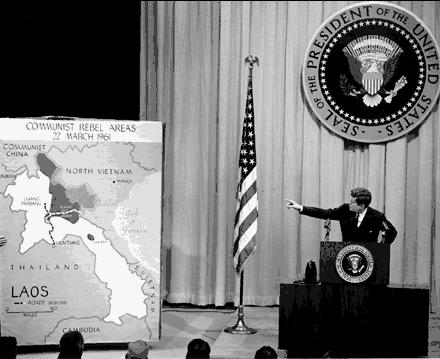|
|

President Kennedy came into office with a belief that America could and should shape the destiny of the world's developing countries. Vietnam, however, was not primarily what he had in mind. Vietnam was not on the president's list of priorities nor was it discussed as key issues at the transition meeting between Kennedy and President Eisenhower. Indeed, Kennedy remarked in the middle of his administration, after Vietnam had become a more urgent issue, "You know, Eisenhower never mentioned it, never uttered the word Vietnam."
President Kennedy believed that the instability of developing countries demanded new approaches. Kennedy was especially taken by the analysis of MIT economist Walt W. Rostow, who believed that all nations followed the same general path of economic and social development. He argued that nations became unstable as the reached the phase he called "modernization."
The Kennedy administration was guided in part by this modernization model as it considered a way to protect South Vietnam while help it throughout the stages of economic growth. Most of Kennedy's advisers believed that South Vietnam was not in danger. As Robert McNamara, Secretary of Defense said once, "North Vietnam will never beat us. They can't even make ice cubes."
Only one of Kennedy's key advisers spoke against the war. Secretary of State for Economic Affairs George Ball, warned the president that Vietnam would not easily bent to America's will. To maintain the independent South Vietnam, Ball insisted, would mean that in "five years there will be 300,000 American soldiers fighting in Vietnam." To this prophecy, Kennedy replied, "George you're crazier than hell."
In May 1961, President Kennedy sent 500 more American advisers to Vietnam, bringing American forces to 1,400 men. The military wanted more men saying that with 13,000 troops they could wipe out the Vietcong. Kennedy didn't know what to do; as men he trusted argued both sides of the issue.
Kennedy was not deciding the fate of Vietnam with a worry free head. Cuba, Berlin, Laos, and the Soviet Union all weighed on the President. Kennedy believed that the real issue in Vietnam was the effectiveness of the South Vietnamese government but whether the US would allow Communist aggression to stand in Vietnam. Apparently, Vietnam had turned into a test of American resolve; Kennedy hated the idea of failing the test. Slowly, over the next year, Kennedy escalated American involvement in the war.
By the end of 1962, the military had received what they wanted. The US had 11,300 officers operating in South Vietnam. Kennedy was told in early 1963 that the war was fast being won and that he could begin withdrawing troops by the end of the year. The war was far from being won.
South Vietnam was a mess. The Diem regime had become a nightmare. Either by the stealing of American aid and military supplies, it's refusal to implement land reform programs, or the continued attack on the Buddhist community; Diem had to go it the war was to be won. Kennedy agreed for the CIA to assist in a South Vietnamese army coup against Diem. On November 2, 1963, Diem was assassinated.
Kennedy still did not know was policy to pursue in Vietnam. He had already begun to speak to his advisers about pulling out. He had announced that he was pulling out 1,000 men from Vietnam at the end of the year. Kennedy, however, left no doubt that he will see the war through until he won reelection in 1964. Kennedy was assassinated on November 22, 1963. The only thing certain about Kennedy's role in Vietnam before he died was that he had escalated America's military, political, and maybe psychological commitment to Vietnam.
|
|
|
|
|
 Vietnam War History
Vietnam War History
